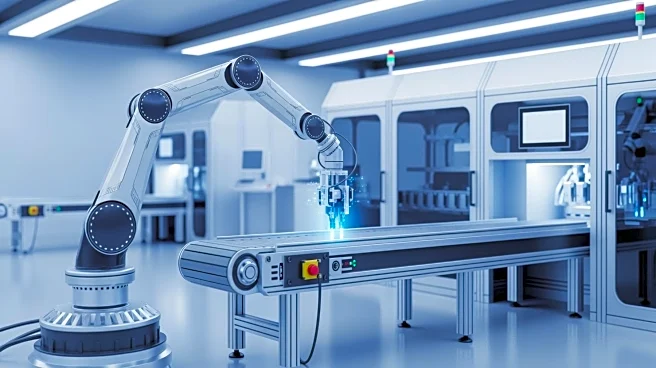What's Happening?
The manufacturing sector is increasingly adopting AI technologies to improve operations and productivity. AI models and machine learning have been utilized in industrial automation for quality control
inspections, robotics, and maintenance applications. Recently, generative AI and agentic AI are being introduced to enhance operator productivity, automate reporting, and aid in adaptive planning. These technologies are working together to push automation processes to new levels, particularly in predictive maintenance. AI-powered innovation in predictive maintenance uses machine data from Industrial Internet of Things (IIoT) sensors combined with AI/ML analytics to detect and resolve potential asset problems before failure, minimizing downtime and reducing maintenance costs.
Why It's Important?
The integration of AI in manufacturing is significant as it reshapes critical industrial use cases, enhancing efficiency and reducing operational costs. Predictive maintenance, powered by AI, offers proactive solutions to asset management, preventing costly downtimes and extending equipment life. This technological advancement positions manufacturers to optimize their operations, improve productivity, and maintain competitive advantage in the industry. The ability of AI to solve non-standard problems and adaptively learn further increases its value, making it a game-changer for industrial applications.
What's Next?
As AI technologies mature, their integration into manufacturing operations is expected to deepen, potentially leading to more autonomous decision-making processes. Manufacturers may continue to explore AI's capabilities in other areas such as supply chain optimization and energy management. The ongoing development of AI technologies could also lead to stricter cybersecurity and compliance measures, especially in sensitive sectors like power generation.
Beyond the Headlines
The adoption of AI in manufacturing raises ethical and legal considerations, particularly regarding data privacy and security. As AI systems become more autonomous, the role of human oversight and accountability in decision-making processes becomes crucial. Additionally, the shift towards AI-driven operations may impact workforce dynamics, necessitating new skills and training for employees.










